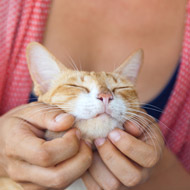
Impulse buys putting pet welfare at risk
The health and welfare of millions of pets is at risk as owners continue to buy pets on impulse, often with no research or understanding of their welfare needs.
Created in conjunction with YouGov, the PDSA’s Animal Wellbeing (PAW) Report identifies key issues impacting on the welfare of UK pets. Since is launch in 2011, the report has surveyed over 58,000 veterinary professionals, pet owners and young people.
This years’ report reveals that some 5.2 million (around one-in-four) pet owners in the UK do no pre-purchase research before getting a pet. In fact, just five per cent of owners (1.1 million) said they spoke to a vet before they acquired a pet.
Even more cause for concern is the lack of awareness of the five welfare needs. The survey found that 65 per cent of pet owners were unaware of how to provide what their pets need to lead happy and healthy lives.
Commenting on the findings, PDSA's senior vet Sean Wensley said: “There is little doubt that we’re a nation of animal-lovers. But the PAW Report highlights that impulse-buying pets is still an issue of great concern, and shows no signs of improving.
“Little or no research before getting a pet means owners have limited understanding of what their pets require throughout their lives, which is undoubtedly leading to an array of other troubling pet welfare problems.”
The survey of 4,252 pet owners in the UK revealed that 22 per cent of owners (4.8 million) find their pets harder work than anticipated.
Many owners said they drastically underestimated the financial implications of owning a pet, with 12 per cent (2.6 million) of people believing their pet would only cost up to £500 over their entire lifetime.
Limited awareness of the costs involved in pet ownership - in particular understanding the real cost of owning a dog - is listed as the top concern for the veterinary profession. An alarming 98 per cent of owners underestimated the lifetime cost of owning their pet.
In response to the lack of pre-purpose research, PDSA has launched a free ‘Which Pet?’ consultation framework for veterinary teams. The aim of the initiative is to help veterinary professional engage and educate clients before they take on a new pet.
In doing this, the charity hopes prospective owners can be certain their chosen pet is suitable for them, and obtained from an appropriate source.



 The Animal and Plant Health Agency (APHA) has updated its online reporting service for dead wild birds.
The Animal and Plant Health Agency (APHA) has updated its online reporting service for dead wild birds.